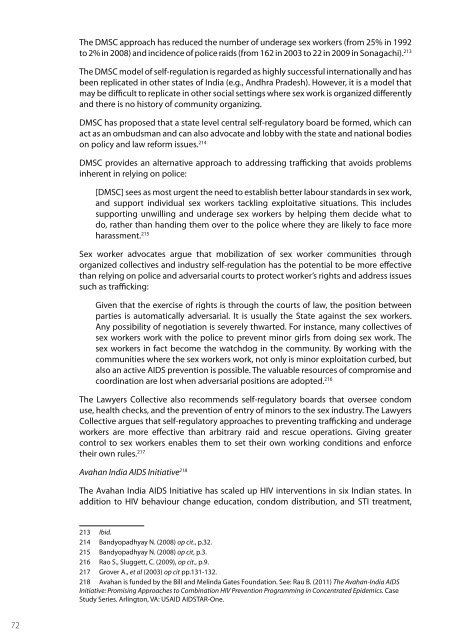SEX WORK AND THE LAW - HIV/AIDS Data Hub
SEX WORK AND THE LAW - HIV/AIDS Data Hub
SEX WORK AND THE LAW - HIV/AIDS Data Hub
Create successful ePaper yourself
Turn your PDF publications into a flip-book with our unique Google optimized e-Paper software.
The DMSC approach has reduced the number of underage sex workers (from 25% in 1992<br />
to 2% in 2008) and incidence of police raids (from 162 in 2003 to 22 in 2009 in Sonagachi). 213<br />
The DMSC model of self-regulation is regarded as highly successful internationally and has<br />
been replicated in other states of India (e.g., Andhra Pradesh). However, it is a model that<br />
may be difficult to replicate in other social settings where sex work is organized differently<br />
and there is no history of community organizing.<br />
DMSC has proposed that a state level central self-regulatory board be formed, which can<br />
act as an ombudsman and can also advocate and lobby with the state and national bodies<br />
on policy and law reform issues. 214<br />
DMSC provides an alternative approach to addressing trafficking that avoids problems<br />
inherent in relying on police:<br />
[DMSC] sees as most urgent the need to establish better labour standards in sex work,<br />
and support individual sex workers tackling exploitative situations. This includes<br />
supporting unwilling and underage sex workers by helping them decide what to<br />
do, rather than handing them over to the police where they are likely to face more<br />
harassment. 215<br />
Sex worker advocates argue that mobilization of sex worker communities through<br />
organized collectives and industry self-regulation has the potential to be more effective<br />
than relying on police and adversarial courts to protect worker’s rights and address issues<br />
such as trafficking:<br />
Given that the exercise of rights is through the courts of law, the position between<br />
parties is automatically adversarial. It is usually the State against the sex workers.<br />
Any possibility of negotiation is severely thwarted. For instance, many collectives of<br />
sex workers work with the police to prevent minor girls from doing sex work. The<br />
sex workers in fact become the watchdog in the community. By working with the<br />
communities where the sex workers work, not only is minor exploitation curbed, but<br />
also an active <strong>AIDS</strong> prevention is possible. The valuable resources of compromise and<br />
coordination are lost when adversarial positions are adopted. 216<br />
The Lawyers Collective also recommends self-regulatory boards that oversee condom<br />
use, health checks, and the prevention of entry of minors to the sex industry. The Lawyers<br />
Collective argues that self-regulatory approaches to preventing trafficking and underage<br />
workers are more effective than arbitrary raid and rescue operations. Giving greater<br />
control to sex workers enables them to set their own working conditions and enforce<br />
their own rules. 217<br />
Avahan India <strong>AIDS</strong> Initiative 218<br />
The Avahan India <strong>AIDS</strong> Initiative has scaled up <strong>HIV</strong> interventions in six Indian states. In<br />
addition to <strong>HIV</strong> behaviour change education, condom distribution, and STI treatment,<br />
213 Ibid.<br />
214 Bandyopadhyay N. (2008) op cit., p.32.<br />
215 Bandyopadhyay N. (2008) op cit, p.3.<br />
216 Rao S., Sluggett, C. (2009), op cit., p.9.<br />
217 Grover A., et al (2003) op cit pp.131-132.<br />
218 Avahan is funded by the Bill and Melinda Gates Foundation. See: Rau B. (2011) The Avahan-India <strong>AIDS</strong><br />
Initiative: Promising Approaches to Combination <strong>HIV</strong> Prevention Programming in Concentrated Epidemics. Case<br />
Study Series. Arlington, VA: USAID <strong>AIDS</strong>TAR-One.<br />
72
















